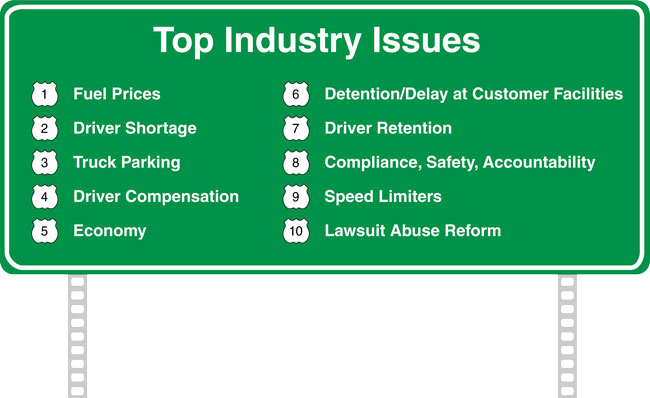Senior Reporter
Cost of Fuel Ranks as Trucking’s Top Concern in ATRI 2022 Survey

[Stay on top of transportation news: Get TTNews in your inbox.]
SAN DIEGO — Fuel prices overtook the driver shortage as the top issue of concern expressed by drivers and motor carriers in the American Transportation Research Institute’s 2022 Top Industry Issues survey, made public here on Oct. 22.
The pair ranked No. 1 and No. 2 on the list, and were followed by a lack of available truck parking; driver compensation; the state of the economy; long detention times; driver retention; the Compliance, Safety Accountability safety scoring system; speed limiters and lawsuit abuse reform.
The top three issues expressed exclusively by commercial drivers were truck parking, fuel prices and driver compensation. Top issues for motor carriers were driver shortage, driver retention and fuel prices.

Debra Devine/Transport Topics
It was the first time that fuel price concerns made the top 10 list since 2013, when it weighed in at No. 8. Driver shortages had been the No. 1 concern on the list for each of the past five years.
This year’s issue list, the 18th survey by ATRI, was compiled from 4,200 survey respondents, including drivers, motor carriers and a small mix of other industry stakeholders. It was a record number of responses, said Rebecca Brewster, president of ATRI.
“I was not surprised to see speed limiters on the list,” Brewster said in an interview. “But to see so many drivers weigh in so strongly on speed limiters — they are very worried about the speed limiters. They repeatedly cite the potential for road rage from speed differentials. There’s a lot of safety concerns wrapped around that one.”
It was the first time speed limiters made the ATRI list, which first began in 2005. Earlier this year the Federal Motor Carrier Safety Administration issued a notice of intent to issue a speed limiter rule sometime in 2023 that would limit the speed of large trucks.
Side-by-side comparison of where drivers and motor carriers rank the issues. #ATAmce22 pic.twitter.com/jiMTuxpeuN — American Trucking (@TRUCKINGdotORG) October 22, 2022
The FMCSA notice was an initial step, intended to gather information and data to help draft a supplemental rule proposal to require interstate motor carriers to install in commercial vehicles electronic engine control units to set a maximum speed.
Dan Murray, ATRI’s senior vice president, cautioned truckers to not play down the driver shortage dropping to No. 2.
“It’s just that fuel had been in an acute way catastrophic,” Murray said. “The driver shortage is worse than its ever been. That in the long run is going to be our single-biggest issue. It kind of hints that maybe we’re not doing the best job in dealing with the chronic issues.”
“The driver shortage is an issue that’s not going to go away,” said Dennis Dellinger, president of Cargo Transporters Inc., a panel member at the ATRI issue survey session here.
“Pay people,” panelist Dee Sova, an America’s Road Team Captain driver with Prime Inc., said in response to a discussion of driver compensation, No. 4 on the list.
“Drivers need to be able to provide for their families. Trucking took me out of poverty. I had to provide for my four daughters.”
The driver shortage and driver compensation are familiar top issues on the list. The industry has long been short of available drivers, an issue made worse amid the pandemic. Amid skyrocketing freight demand, American Trucking Associations estimated the shortage hit a historic high of just over 80,000 truck drivers last year. The issue was compounded by difficulties in getting equipment, primarily driven by a shortage of semiconductor chips that are critical components of modern trucks. Many fleets responded by, among other things, increasing compensation.
The 2022 ATA Driver Compensation Study on Aug. 10 found the median pay for truckload drivers increased 18% year-over-year to $69,000 in 2021. The median compensation for less-than-truckload fleets hit $73,000. The median salary for a driver at a private fleet was $85,000. The study covered fleets with more than 135,000 employee drivers and nearly 20,000 independent contractors.
Want more news? Listen to today's daily briefing below or go here for more info:


